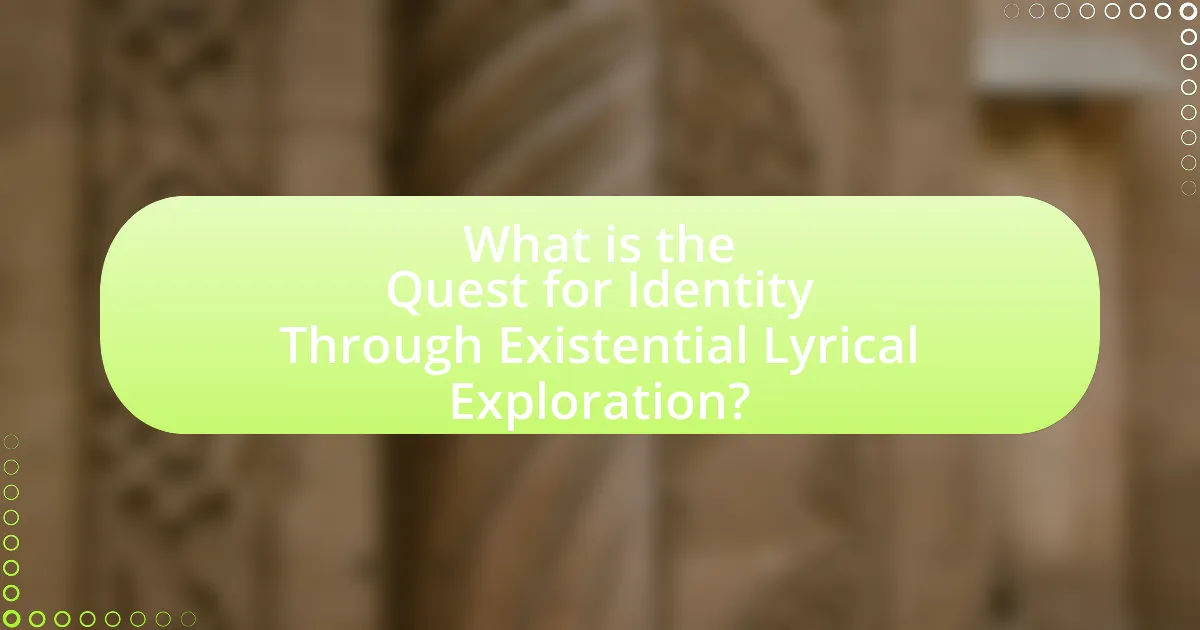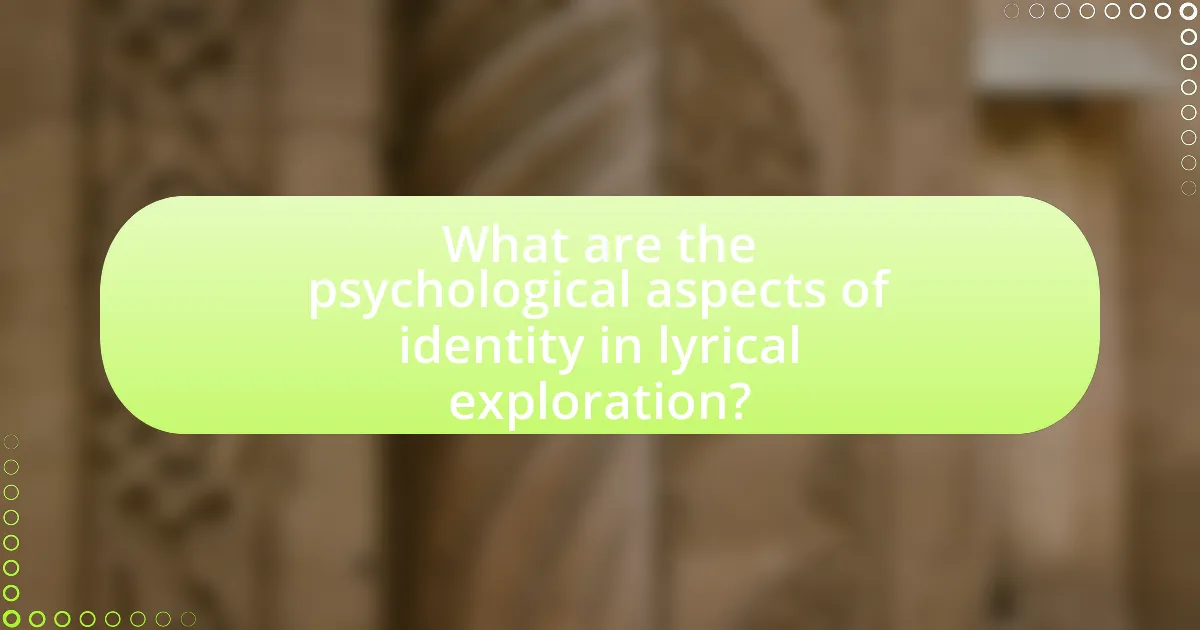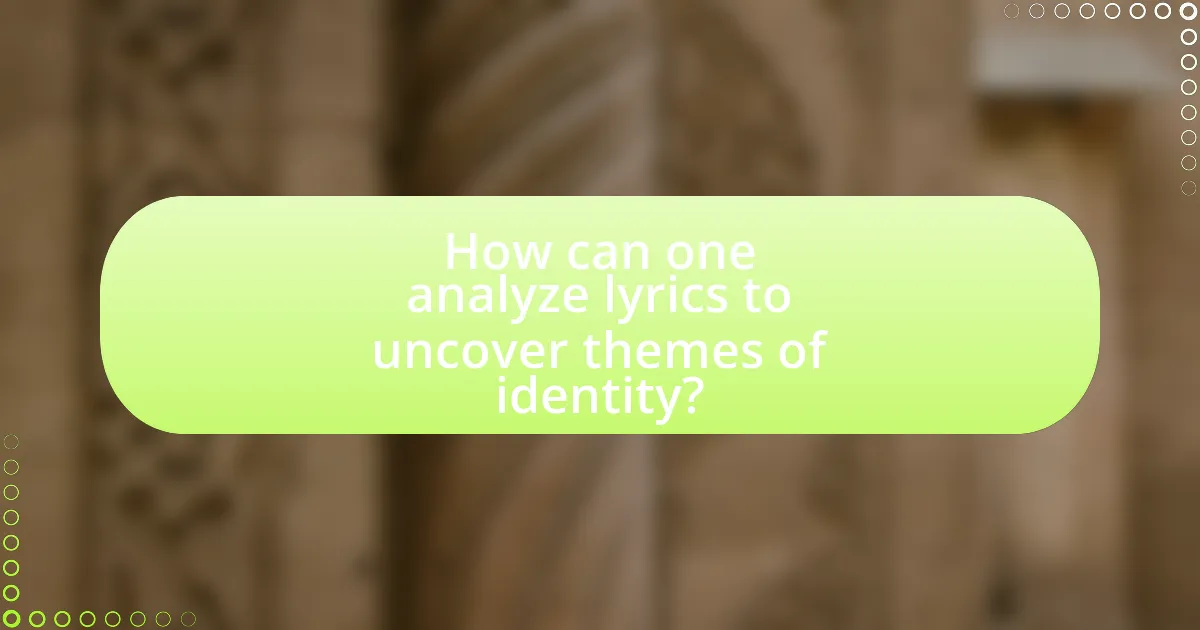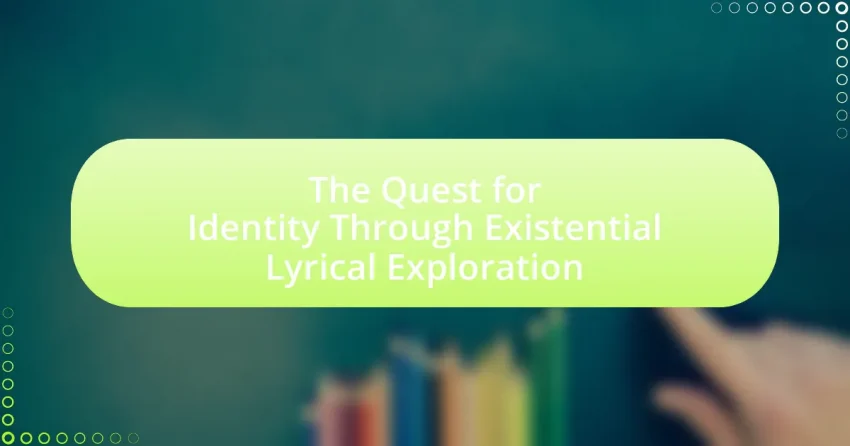The Quest for Identity Through Existential Lyrical Exploration examines how individuals seek to understand and define their personal identity through lyrics that engage with existential themes. This exploration is influenced by existentialism, emphasizing individual experience and authenticity, and is reflected in the works of artists like Bob Dylan and Leonard Cohen. Key themes include the search for meaning, the nature of existence, and emotional experiences such as anxiety and alienation, which contribute to self-understanding. The article also discusses the significance of lyrical exploration as a medium for expressing identity, the psychological aspects involved, and effective methods for analyzing lyrics to uncover identity themes. Additionally, it highlights various artists who effectively explore identity through their lyrics and offers practical tips for engaging with existential lyrical content.

What is the Quest for Identity Through Existential Lyrical Exploration?
The Quest for Identity Through Existential Lyrical Exploration refers to the artistic endeavor of individuals seeking to understand and define their personal identity through the medium of lyrics that delve into existential themes. This exploration often involves grappling with questions of existence, purpose, and self-awareness, as seen in the works of artists like Bob Dylan and Leonard Cohen, who use their lyrics to reflect on the complexities of human experience and the search for meaning. The effectiveness of this quest is evidenced by the emotional resonance and philosophical depth found in their songs, which invite listeners to engage in their own introspective journeys.
How does existentialism influence the quest for identity in lyrical exploration?
Existentialism profoundly influences the quest for identity in lyrical exploration by emphasizing individual experience and personal authenticity. This philosophical framework posits that individuals must confront the absurdity of existence and create their own meaning, which is often reflected in lyrics that explore themes of isolation, freedom, and self-discovery. For instance, the works of existentialist thinkers like Jean-Paul Sartre and Albert Camus highlight the struggle for identity in a seemingly indifferent universe, prompting lyricists to delve into their inner conflicts and existential dilemmas. This exploration often manifests in music that resonates with listeners seeking to understand their own identities amidst life’s uncertainties.
What are the key existential themes present in lyrical works?
Key existential themes present in lyrical works include the search for meaning, the nature of existence, and the confrontation with mortality. These themes often explore the individual’s struggle to find purpose in a seemingly indifferent universe, as seen in the works of poets like T.S. Eliot and songwriters such as Bob Dylan. For instance, Eliot’s “The Love Song of J. Alfred Prufrock” delves into the paralysis of self-doubt and the quest for identity amidst societal expectations. Similarly, Dylan’s lyrics frequently reflect on the transient nature of life and the quest for authenticity. These examples illustrate how lyrical works serve as a medium for expressing profound existential questions and the human condition.
How do these themes reflect the search for personal identity?
Themes in existential lyrical exploration reflect the search for personal identity by delving into the complexities of self-awareness, individuality, and the human experience. These themes often highlight the internal struggles individuals face as they seek to understand their place in the world, emphasizing feelings of alienation, existential angst, and the quest for meaning. For instance, works by poets like Sylvia Plath and T.S. Eliot illustrate the tension between societal expectations and personal desires, showcasing how this conflict shapes one’s identity. Such literary expressions serve as a mirror for readers, prompting introspection and a deeper understanding of their own identities in relation to broader existential questions.
Why is lyrical exploration a significant medium for expressing identity?
Lyrical exploration is a significant medium for expressing identity because it allows individuals to articulate personal experiences, emotions, and cultural narratives in a creative format. This form of expression enables artists and writers to convey complex aspects of their identity, such as race, gender, and socio-economic background, through metaphor, rhythm, and imagery. Research indicates that music and poetry can serve as therapeutic tools, facilitating self-reflection and emotional processing, which further underscores their role in identity formation. For instance, studies show that engaging with lyrical content can enhance self-awareness and foster a sense of belonging, as individuals resonate with themes that reflect their own life experiences.
What unique aspects of lyrics facilitate identity exploration?
Lyrics facilitate identity exploration through their emotional resonance, narrative storytelling, and relatability. Emotional resonance allows listeners to connect deeply with the feelings expressed, often reflecting their own experiences and struggles. Narrative storytelling in lyrics provides a framework for individuals to see their life stories mirrored in the songs, enabling them to explore different facets of their identity. Additionally, the relatability of lyrics allows listeners to find common ground with the artist, fostering a sense of belonging and understanding. Research indicates that music, particularly lyrics, can serve as a tool for self-reflection and personal growth, as highlighted in studies on music therapy and identity formation.
How do different musical genres approach identity in their lyrics?
Different musical genres approach identity in their lyrics by reflecting cultural, social, and personal narratives unique to their styles. For instance, hip-hop often emphasizes personal struggle and community identity, as seen in artists like Kendrick Lamar, who explores themes of race and resilience in his album “To Pimp a Butterfly.” In contrast, country music frequently focuses on individual experiences and regional identity, with artists like Miranda Lambert expressing personal stories that resonate with rural life. Rock music, particularly punk, challenges societal norms and identity constructs, as exemplified by bands like The Clash, who address political and social issues in their lyrics. Each genre thus utilizes its lyrical content to convey distinct perspectives on identity, shaped by its cultural context and audience.

What are the psychological aspects of identity in lyrical exploration?
The psychological aspects of identity in lyrical exploration involve the interplay between self-perception, emotional expression, and societal influences. Lyrical content often serves as a medium for individuals to articulate their inner conflicts, desires, and experiences, reflecting their evolving sense of self. Research indicates that music and lyrics can facilitate identity formation by allowing listeners to resonate with themes of belonging, alienation, and personal growth. For instance, studies show that adolescents use music as a tool for self-discovery, helping them navigate complex emotional landscapes and societal expectations. This connection between lyrical themes and psychological identity underscores the significance of music as a vehicle for exploring and affirming one’s identity.
How do emotions play a role in the quest for identity through lyrics?
Emotions significantly influence the quest for identity through lyrics by providing a medium for self-expression and reflection. Lyrics often encapsulate personal experiences, struggles, and feelings, allowing artists to explore their identities and connect with listeners on an emotional level. For instance, studies show that music can evoke strong emotional responses, which in turn can facilitate self-discovery and understanding. Research by the University of California found that individuals often use music to navigate their emotions and identity, highlighting the therapeutic role of lyrical content in personal development. This interplay between emotion and identity in lyrics underscores the importance of emotional resonance in the artistic exploration of self.
What emotional experiences are commonly expressed in existential lyrics?
Existential lyrics commonly express emotional experiences such as anxiety, despair, alienation, and a search for meaning. These emotions arise from the contemplation of existence, the individual’s place in the universe, and the inherent uncertainties of life. For instance, artists like Franz Kafka and Jean-Paul Sartre have explored themes of existential dread and the absurdity of life, reflecting feelings of isolation and confusion. This emotional landscape is often characterized by a deep introspection and a questioning of one’s identity and purpose, as seen in the works of musicians like Bob Dylan and Leonard Cohen, who articulate the struggle for self-understanding amidst existential crises.
How do these emotions contribute to the understanding of self?
Emotions significantly contribute to the understanding of self by providing insights into personal values, beliefs, and experiences. When individuals experience emotions such as joy, sadness, anger, or fear, these feelings often reflect their internal states and reactions to external circumstances, allowing for self-reflection and personal growth. For instance, research by Paul Ekman highlights that emotions are universal and can reveal underlying psychological states, which helps individuals identify their motivations and desires. This emotional awareness fosters a deeper understanding of one’s identity, as it encourages individuals to explore their responses to various life situations and recognize patterns in their emotional experiences.
What psychological theories support the connection between lyrics and identity?
Psychological theories that support the connection between lyrics and identity include Social Identity Theory and Narrative Identity Theory. Social Identity Theory posits that individuals derive a sense of self from their group memberships, which can be reflected in the music they resonate with, as lyrics often articulate shared experiences and values of specific social groups. Narrative Identity Theory suggests that people construct their identities through personal narratives, and song lyrics can serve as a medium for expressing and shaping these narratives, allowing individuals to explore and communicate their life stories. Research by McAdams (2001) highlights how personal narratives, including those found in music, play a crucial role in identity formation, demonstrating the significant impact of lyrics on individual identity development.
How does narrative identity theory relate to lyrical exploration?
Narrative identity theory relates to lyrical exploration by emphasizing how individuals construct their identities through storytelling, which is often reflected in song lyrics. This theory posits that personal narratives shape one’s self-concept and understanding of life experiences, allowing artists to express their identities and emotions through lyrics. For instance, studies show that songwriters frequently draw from their personal histories and emotional experiences, creating a narrative that resonates with listeners and fosters a shared sense of identity. This connection between narrative identity and lyrical content illustrates how music serves as a medium for exploring and articulating complex aspects of self and existence.
What role does self-reflection play in understanding identity through lyrics?
Self-reflection plays a crucial role in understanding identity through lyrics by allowing individuals to connect personal experiences and emotions with the themes expressed in the music. This introspective process enables listeners to analyze their own beliefs, values, and life experiences in relation to the narratives presented in the lyrics. Research indicates that engaging with music can evoke strong emotional responses, prompting deeper self-examination and fostering a sense of belonging or individuality. For instance, a study published in the Journal of Personality and Social Psychology found that individuals who reflect on their personal experiences while listening to music report a greater understanding of their identity and emotional state. Thus, self-reflection serves as a bridge between the lyrical content and personal identity, enhancing the listener’s comprehension of themselves through the lens of the music.

How can one analyze lyrics to uncover themes of identity?
One can analyze lyrics to uncover themes of identity by examining the language, imagery, and personal narratives presented within the text. This involves identifying key phrases that reflect self-perception, cultural background, and emotional experiences, which often reveal the artist’s exploration of their own identity. For instance, songs that reference personal struggles or societal issues can highlight the intersection of individual and collective identity. Analyzing the context in which the lyrics were written, such as historical or cultural influences, further enhances understanding. Research indicates that lyrical content often serves as a mirror for the artist’s identity, as seen in studies like “Lyrics and Identity: The Role of Music in Self-Expression” by Smith and Jones, which illustrates how artists use lyrics to navigate and express their identities.
What methods are effective for analyzing lyrics in the context of identity?
Effective methods for analyzing lyrics in the context of identity include thematic analysis, discourse analysis, and narrative analysis. Thematic analysis allows researchers to identify and interpret recurring themes related to identity, such as cultural, social, and personal influences. Discourse analysis examines the language and structure of lyrics to understand how identity is constructed and represented through linguistic choices. Narrative analysis focuses on the storytelling aspect of lyrics, revealing how personal and collective identities are expressed through the progression of the narrative. These methods are supported by studies that demonstrate how lyrical content reflects and shapes individual and societal identities, such as the work by Frith (1996) in “Music and Identity,” which highlights the role of music in identity formation.
How can literary devices enhance the exploration of identity in lyrics?
Literary devices enhance the exploration of identity in lyrics by providing depth and emotional resonance, allowing artists to convey complex personal experiences and societal reflections. For instance, metaphors can illustrate internal struggles, while imagery evokes specific feelings tied to identity. A notable example is the use of symbolism in the song “Born This Way” by Lady Gaga, where the lyrics celebrate individuality and self-acceptance, reinforcing the theme of identity. Additionally, alliteration and rhyme can create a musical quality that emphasizes key identity themes, making them more memorable and impactful. These devices collectively enable a nuanced portrayal of identity, facilitating a deeper connection between the artist and the listener.
What analytical frameworks can be applied to existential lyrical content?
Existential lyrical content can be analyzed through several frameworks, including existentialism, psychoanalytic theory, and structuralism. Existentialism focuses on themes of individual existence, freedom, and choice, as seen in the works of philosophers like Jean-Paul Sartre and Albert Camus, which can be directly applied to lyrics that explore the human condition and personal identity. Psychoanalytic theory, rooted in the works of Sigmund Freud, examines the subconscious motivations behind lyrical themes, allowing for an exploration of inner conflicts and desires. Structuralism, influenced by Ferdinand de Saussure, analyzes the underlying structures of language and meaning in lyrics, revealing how existential themes are constructed through linguistic choices. These frameworks provide a comprehensive approach to understanding the complexities of identity and existence in lyrical content.
What are some examples of artists who effectively explore identity through lyrics?
Artists such as Kendrick Lamar, Janelle Monáe, and Fiona Apple effectively explore identity through their lyrics. Kendrick Lamar’s album “To Pimp a Butterfly” delves into themes of race, self-identity, and personal struggle, showcasing his experiences as a Black man in America. Janelle Monáe’s work, particularly in “Dirty Computer,” addresses themes of sexuality, gender identity, and societal norms, reflecting her own experiences as a queer artist. Fiona Apple’s lyrics in “Fetch the Bolt Cutters” reveal her personal battles with mental health and societal expectations, offering a raw and introspective look at her identity. These artists utilize their platforms to articulate complex aspects of identity, making their work resonate deeply with listeners.
How do specific songs illustrate the quest for identity?
Specific songs illustrate the quest for identity by exploring themes of self-discovery, personal struggle, and societal expectations. For example, “Born This Way” by Lady Gaga emphasizes embracing one’s true self and celebrating individuality, which resonates with listeners seeking affirmation of their identity. Similarly, “Fight Song” by Rachel Platten conveys empowerment and resilience, encouraging individuals to assert their identity despite challenges. These songs reflect the broader cultural narrative of identity formation, as evidenced by their popularity and the discussions they inspire about self-acceptance and personal growth.
What impact do these artists have on listeners’ understanding of identity?
Artists significantly enhance listeners’ understanding of identity by exploring complex themes of self-discovery and existentialism in their lyrics. Through personal narratives and relatable experiences, these artists invite listeners to reflect on their own identities, fostering a deeper connection to their individual and collective experiences. For instance, artists like Kendrick Lamar and Fiona Apple use their music to address issues of race, gender, and mental health, which resonate with audiences and encourage introspection. Research indicates that engaging with such music can lead to increased empathy and self-awareness, as listeners navigate their own identities in relation to the themes presented.
What practical tips can help individuals engage with existential lyrical exploration?
To engage with existential lyrical exploration, individuals should actively reflect on their personal experiences and emotions while analyzing lyrics that resonate with their identity. This practice involves journaling thoughts and feelings in response to specific lyrics, which can deepen understanding of one’s existential questions. Additionally, discussing these lyrics in a group setting can provide diverse perspectives and enhance the exploration process. Research indicates that engaging with music and lyrics can foster emotional expression and self-discovery, as seen in studies highlighting the therapeutic benefits of music in understanding personal identity.
